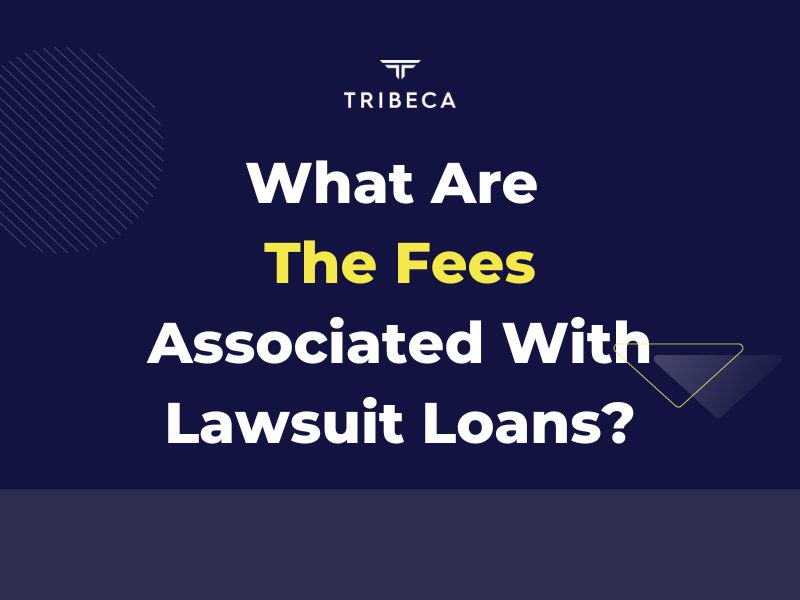It’s crucial to be informed of all potential expenses before applying for a lawsuit loan. Typical fees include the following:
- Application Fees: For the purpose of processing the loan request, some funding companies demand application fees.
- Processing fees: These costs are used to offset the overhead incurred in evaluating and handling the loan.
- Origination Fees: When the loan has been granted and disbursed, origination fees are levied.
- Interest Rates: Lawsuit loans, like conventional loans, can include an interest rate added to the total amount borrowed.
- Prepayment Penalties: In rare instances, a prepayment penalty is charged if the debt is repaid prior to resolving the case.
What are the typical rates involved?
The interest rates for litigation loans might differ greatly amongst funding companies. It is vital to carefully go through and contrast the prices that various companies have to offer.
The total cost of the loan is determined by variables like the length of the case and the anticipated settlement agreement, and rates are often presented as a monthly percentage.
Unlike other lenders, Tribeca Lawsuit Loans offers capped deals and simple interest rates. In actuality, you owe us absolutely nothing if you lose your lawsuit.
How Fees Are Calculated
When calculating the costs, funding businesses consider the risks connected with the case, the likelihood of success, and the anticipated settlement or award amount. Typically, the costs are determined as a percentage of the anticipated recovery.
Before concluding the loan agreement, it is important to discuss the precise calculation process with the provider because it can vary between businesses.
Comparison of Lawsuit Loan Fees to Other Forms of Funding
It’s critical to weigh the costs of litigation loans against those of alternative sources of funds. For litigants in need of financial assistance, further options include traditional loans, credit cards, and personal savings.
Due to the inherent risks involved and the fact that loan repayment plans are based on the outcome of the case, legal funding typically carry higher costs. Before choosing a financing option, it is essential to carefully compare the conditions, interest rates, and repayment alternatives of each.
How to Choose a Lawsuit Loan Provider
The factors that follow are vital to take note of while choosing a lawsuit loan provider:
- Reputation and Experience: Look into the reputation, read reviews, and examine the background of the provider.
- Fees and Interest Rates: Evaluate the costs and interest rates that various providers are offering.
- Transparency: Verify that the provider’s terms and conditions are unambiguous and transparent.
- Customer service: Consider how well the supplier responds to your inquiries and its level of customer service.
By carefully weighing all of this, you can select a respectable and trustworthy lawsuit loan company, like Tribeca, that satisfies your unique requirements.
Frequently Asked Questions
What are the fees associated with lawsuit loans?
Application, processing, origination, interest, and prepayment penalties are common expenses associated with pre-settlement loans. It’s critical to carefully read the terms and conditions of every provider because the particular fees vary between funding businesses.
Are there any fees associated with applying for a lawsuit loan?
The initial charges for litigation financing are often waived by lawsuit-funding businesses like Tribeca. However, it’s crucial to find out if there will be any processing or application fees when requesting a lawsuit loan. Although upfront costs are often uncommon, loan application fees can differ among funding companies. Before moving further with the application, it is advised to get more information about the cost structure and any additional fees.
Can I negotiate the fees?
In rare circumstances, it can be feasible to bargain the costs with the company offering the litigation loan. Negotiation is not always permitted by businesses, and the result can vary depending on your case’s merits and the extent of funding company rivalry, among other things.
Will my credit score impact the fees?
Due to the possible settlement or judgment serving as security for the loan, pre-settlement loans are typically not dependent on credit scores. Therefore, the fees related to the loan typically remain unaffected by your credit score.
Are there any hidden fees I should be aware of?
Providers of transparent litigation loans shouldn’t have any unforeseen costs. It is vital to read the agreement’s terms and conditions to guarantee you are fully informed of any expenses before moving forward.
What happens if I lose my case?
In almost every instance, you are not obligated to repay the lawsuit loan if your case is unsuccessful. Usually, the reimbursement is subject to the settlement or verdict favoring the plaintiff.
Can I still get a lawsuit loan if I’ve already received funding from another source?
If you have received funds from another source, it may still be feasible to apply for a lawsuit loan in particular situations. Any current finance arrangements must be made known to the prospective lawsuit loan provider throughout the application process, though.
Contact Tribeca Lawsuit Loans Today
If you are seeking a lawsuit loan, it is advised that you compare different lenders, thoroughly study the terms, and speak with lawyers to be sure it will work for your particular situation. You can choose a lawsuit loan with confidence by performing rigorous due research.
Contact Tribeca Lawsuit Loans, an established business that specializes in assisting plaintiffs, to learn more about lawsuit loan alternatives and obtain financial support throughout your legal journey.
Call 866-388-2288 or fill out our secure form right away for FREE, no consultation fees needed, to take the first step toward obtaining the funding you require. If approved, we can disperse the funds to you in as little as 24 hours!

